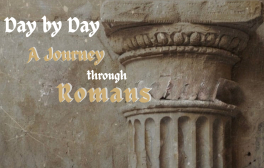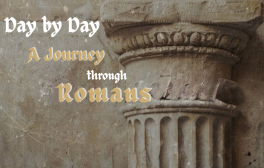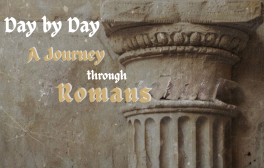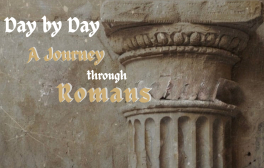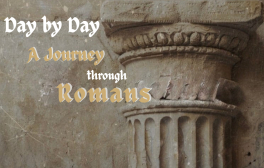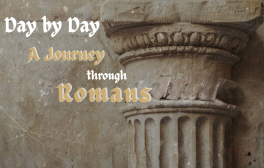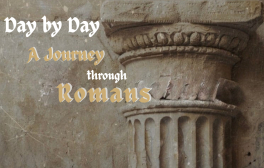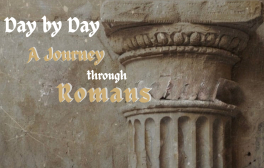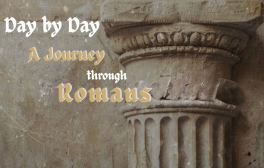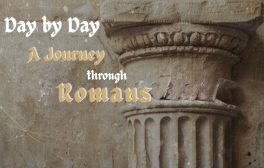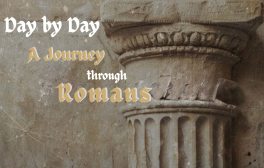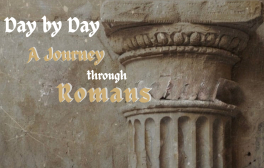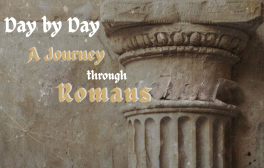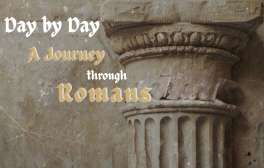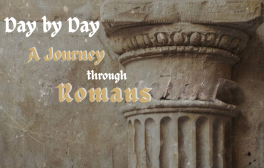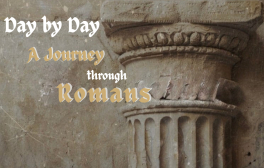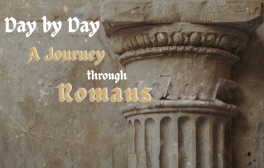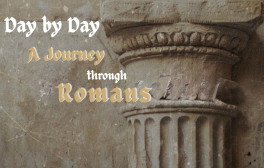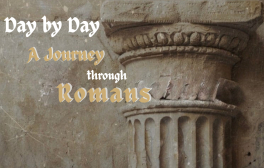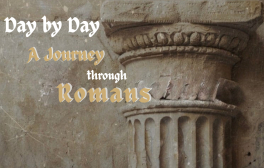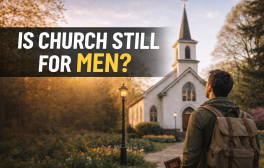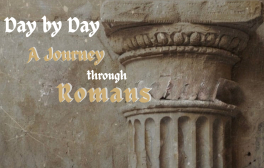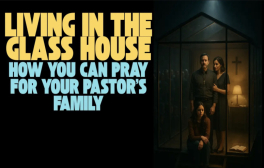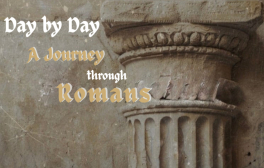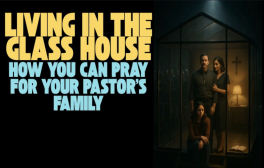Download Media
Search results: 2401 matches Found
Reading Through the Bible - Day By Day
Faithfulness, Unbelief, and God’s Mercy: Lessons from the Book of Numbers
On this episode of Day by Day, reading through the Bible, Dr. Clif explores how the book of Numbers highlights both human failure and God's unending faithfulness as the Israelites journey toward the Promised Land, reminding us that while unbelief has consequences, God's mercy never fails. Stick with reading through the Bible. "Interested in becoming a devoted follower of Christ?" Go to follow.lifeword.org
By: Clif Johnson
(Lifeword)
(Lifeword)
Aired on
Feb 23, 2026
Show
Day by Day
Duration
00:02:50 min.
00:02:50 min.
Day by Day Journey through Romans
Privilege and Accountability: First in Line for Judgment and Grace
On this episode of Day by Day our Journey Through Romans, Dr. Clif mphasizes that spiritual privilege increases accountability before God, but also extends a greater invitation to respond to His grace through Christ, urging listeners to seek humility, repentance, and faith regardless of their background. "Interested in becoming a devoted follower of Christ?" Go to follow.lifeword.org
By: Clif Johnson
(Lifeword)
(Lifeword)
Aired on
Feb 20, 2026
Show
Day by Day
Duration
00:02:09 min.
00:02:09 min.
Day by Day Journey through Romans
Conviction or Invitation? Understanding Grace and Salvation in Romans Chapter 2
On this episode of Day by Day our Journey Through Romans, Dr. Clif emphasizes that conviction is not condemnation but an invitation from God, urging listeners to respond to truth and grace with repentance, faith in Christ, and prayer for others. "Interested in becoming a devoted follower of Christ?" Go to follow.lifeword.org
By: Clif Johnson
(Lifeword)
(Lifeword)
Aired on
Feb 19, 2026
Show
Day by Day
Duration
00:02:18 min.
00:02:18 min.
Day by Day Journey through Romans
Storing Up Grace or Judgment: The Urgency of Responding to God’s Patience
On this episode of Day by Day our Journey Through Romans Dr. Clif urges listeners to recognize the urgency of repentance, warning that delaying is dangerous, as God's patience is mercy with a deadline—not indifference—and that we must seek grace today rather than accumulate judgment. "Interested in becoming a devoted follower of Christ?" Go to follow.lifeword.org
By: Clif Johnson
(Lifeword)
(Lifeword)
Aired on
Feb 18, 2026
Show
Day by Day
Duration
00:02:16 min.
00:02:16 min.
Day by Day Journey through Romans
Which Road Are You Traveling? Eternity's Two Outcomes
On this episode of Day by Day our Journey Through Romans Dr. Clif explains that, according to Romans 2, every person is on one of two roads—obedience to God leading to eternal life, or obedience to self leading to destruction—so it's crucial to examine which path your life is truly on. "Interested in becoming a devoted follower of Christ?" Go to follow.lifeword.org
By: Clif Johnson
(Lifeword)
(Lifeword)
Aired on
Feb 17, 2026
Show
Day by Day
Duration
00:02:27 min.
00:02:27 min.
Reading Through the Bible - Day By Day
Understanding Leviticus: Living with a Holy God
On this episode of Day by Day reading through the Bible, Dr. Clif explains that while Leviticus may seem unfamiliar, it is central to understanding how God's holiness shapes every aspect of life, showing how sinful people can live with a holy God through sacrifice, priesthood, and pointing forward to Christ. "Interested in becoming a devoted follower of Christ?" Go to follow.lifeword.org
By: Clif Johnson
(Lifeword)
(Lifeword)
Aired on
Feb 16, 2026
Show
Day by Day
Duration
00:02:51 min.
00:02:51 min.
Day by Day Journey through Romans
God's Impartial Justice: Hope and Humility at the Foot of the Cross
On this episode of Day by Day our Journey Through Romans, Dr. Clif emphasizes that God shows no favoritism, judging everyone by the same standard, which humbles the proud, comforts the overlooked, and points to Christ as the only true hope for all. "Interested in becoming a devoted follower of Christ?" Go to follow.lifeword.org
By: Clif Johnson
(Lifeword)
(Lifeword)
Aired on
Feb 13, 2026
Show
Day by Day
Duration
00:01:42 min.
00:01:42 min.
Day by Day Journey through Romans
Spiritual Privileges: Responsibility Over Immunity in Romans 2
On this episode of Day by Day our Journey Through Romans, Dr. Clif emphasizes that having spiritual privileges increases our responsibility to live out our faith, warning that simply being close to spiritual truth without genuine repentance and action can actually become a spiritual liability. "Interested in becoming a devoted follower of Christ?" Go to follow.lifeword.org
By: Clif Johnson
(Lifeword)
(Lifeword)
Aired on
Feb 12, 2026
Show
Day by Day
Duration
00:02:07 min.
00:02:07 min.
Day by Day Journey through Romans
Faith That Transforms: The Evidence of Salvation in Our Works
On this episode of Day by Day our Journey Through Romans, Dr. Clif emphasizes that while good works don't earn salvation, they serve as vital evidence of genuine faith, reflecting the transformation brought by the Holy Spirit. "Interested in becoming a devoted follower of Christ? Go to follow.lifeword.org
By: Clif Johnson
(Lifeword)
(Lifeword)
Aired on
Feb 11, 2026
Show
Day by Day
Duration
00:02:07 min.
00:02:07 min.
Day by Day Journey through Romans
Facing God's Fair Judgment: Righteousness, Repentance, and the Beauty of the Gospel
On this episode of Day by Day our Journey Through Romans, Dr. Clif emphasizes that God's judgment is perfectly fair, unwaveringly righteous, and not influenced by favoritism or excuses, making our only hope the righteousness found in Christ. "Interested in becoming a devoted follower of Christ?" Go to follow.lifeword.org
By: Clif Johnson
(Lifeword)
(Lifeword)
Aired on
Feb 10, 2026
Show
Day by Day
Duration
00:02:08 min.
00:02:08 min.
Reading Through the Bible - Day By Day
Exodus: From Slavery to Fellowship with God
On this episode of Day by Day, Reading Through the Bible, Dr. Clif introduces the Book of Exodus, highlighting how God delivers His people from slavery, demonstrates His faithfulness and power, gives them the law after redeeming them, and ultimately dwells among them, emphasizing that salvation comes before obedience.
By: Clif Johnson
(Lifeword)
(Lifeword)
Aired on
Feb 09, 2026
Show
Day by Day
Duration
00:03:16 min.
00:03:16 min.
Day by Day Journey through Romans
Recognizing Mercy: Responding to Conviction and Grace in Romans 1
On this episode of Day by Day our Journey Through Romans, Dr. Clif explores how the discomfort we feel about our spiritual condition is actually God's mercy inviting us to repentance and faith in Christ, who offers grace instead of condemnation. "Interested in becoming a devoted follower of Christ?" Go to follow.lifeword.org
By: Clif Johnson
(Lifeword)
(Lifeword)
Aired on
Feb 06, 2026
Show
Day by Day
Duration
00:02:18 min.
00:02:18 min.
Day by Day Journey through Romans
Transforming the Mind: Renewal vs. Rebellion in the Christian Life
On this episode of Day by Day our Journey Through Romans, Dr. Clif emphasizes that our minds are always moving towards either spiritual renewal or rebellion, and true transformation comes through surrendering to God's work in us, not by our own effort. "Interested in becoming a devoted follower of Christ?" Go to follow.lifeword.org
By: Clif Johnson
(Lifeword)
(Lifeword)
Aired on
Feb 05, 2026
Show
Day by Day
Duration
00:02:12 min.
00:02:12 min.
Day by Day Journey through Romans
The Urgency of the Gospel: Seeing Humanity Through Paul’s Eyes
On this episode of Day by Day our Journey Through Romans, Dr. Clif Johnson explains that Paul’s urgency to preach the gospel comes from recognizing humanity’s desperate spiritual need, and that only the gospel—offering rescue, transformation, and true hope in Christ—can address it. "Interested in becoming a devoted follower of Christ?" Go to follow.lifeword.org
By: Clif Johnson
(Lifeword)
(Lifeword)
Aired on
Feb 04, 2026
Show
Day by Day
Duration
00:02:29 min.
00:02:29 min.
Day by Day Journey through Romans
When Sin Is Celebrated: Standing for Truth in a Culture of Approval
On this episode of Day by Day our Journey Through Romans, Dr. Clif urges believers to resist celebrating or approving what God condemns, emphasizing the importance of speaking truth and loving people well—even when it’s difficult or unpopular. "Interested in becoming a devoted follower of Christ?" Go to follow.lifeword.org
By: Clif Johnson
(Lifeword)
(Lifeword)
Aired on
Feb 03, 2026
Show
Day by Day
Duration
00:02:39 min.
00:02:39 min.
Day by Day Journey through Romans
Saturated with Sin: Understanding Paul’s Diagnosis in Romans 1
On this episode of Day by Day our Journey Through Romans, Dr. Clif explains that, according to Paul's teachings in Romans chapter one, humanity is not just touched by sin but entirely saturated with it, and only through fully confronting this condition can true healing and renewal through Christ begin. "Interested in becoming a devoted follower of Christ?" Go to follow.lifeword.org
By: Clif Johnson
(Lifeword)
(Lifeword)
Aired on
Jan 30, 2026
Show
Day by Day
Duration
00:02:35 min.
00:02:35 min.
Reading Through the Bible - Day By Day
Genesis: The Foundation of God’s Story and Plan
On this episode of Day by Day Reading Through the Bible. Dr. Clif gives an overview of the book of Genesis, highlighting its role as the foundation of the Bible, its major themes and characters, and emphasizing how God's purpose and promises unfold from creation through the lives of imperfect people. Read the Bible, Stick With It "Interested in becoming a devoted follower of Christ?" Go to follow.lifeword.ord
By: Clif Johnson
(Lifeword)
(Lifeword)
Aired on
Feb 02, 2026
Show
Day by Day
Duration
00:03:53 min.
00:03:53 min.
Day by Day Journey through Romans
The Miracle of Grace and a Redeemed Mind
On this episode of Day by Day our Journey Through Romans, Dr. Clif explains that God's judgment sometimes means letting people follow their own desires, but through Christ, God also offers grace that restores and redeems the human mind. "Interested in becoming a devoted follower of Christ?" Go to follow.lifeword.org
By: Clif Johnson
(Lifeword)
(Lifeword)
Aired on
Jan 29, 2026
Show
Day by Day
Duration
00:01:59 min.
00:01:59 min.
Day by Day Journey through Romans
Who Rules Your Mind? Letting God Reign Continually"
On this episode of Day by Day our Journey Through Romans, Dr. Clif mphasizes that for true renewal and stability in faith, God must be allowed to continually reign over our minds rather than being given only occasional acknowledgment. "Interested in becoming a devoted follower of Christ?" Go to follow.lifeword.org
By: Clif Johnson
(Lifeword)
(Lifeword)
Aired on
Jan 28, 2026
Show
Day by Day
Duration
00:02:16 min.
00:02:16 min.
Day by Day our Journey Through Romans
Consequences of a Mind Without God
On this episode of Day by Day our Journey Through Romans, Dr. Clif explains that when humanity rejects God's rule over the mind, it experiences not just cultural decay but divine judgment—yet hope remains through the renewing power of the Gospel and prayer. "Interested in becoming a devoted follower of Christ?" Go to follow.lifeword.org
By: Clif Johnson
(Lifeword)
(Lifeword)
Aired on
Jan 27, 2026
Show
Day by Day
Duration
00:02:25 min.
00:02:25 min.
Day by Day Video
Four Traits of a Healthy Church: Word, Gospel, Christ, and Mission Focused
On this episode of Day by Day, what to look for when looking for a church. Today Dr. Clif and his guest center on identifying and cultivating churches that are word centered, gospel centered, Christ centered, and missions focused, emphasizing that these foundational traits are essential for meaningful, lasting ministry and growth. "Interested in becoming a devoted follower of Christ?" Go to follow.lifeword.org
By: Clif Johnson
(Lifeword)
(Lifeword)
Aired on
Jan 26, 2026
Show
Day by Day
Duration
00:19:40 min.
00:19:40 min.
Day by Day Journey through Romans
Who Has the Final Authority: Christ, Culture, or Desire?"
On this episode of Day by Day our Journey Through Romans, Dr. Clif centers on the question of who holds ultimate authority in our lives—Christ or our own desires—and encourages surrendering to Christ’s authority as the source of true freedom, transformation, and identity. "Interested in becoming a devoted follower of Christ?" Go to follow.lifeword.org
By: Clif Johnson
(Lifeword)
(Lifeword)
Aired on
Jan 23, 2026
Show
Day by Day
Duration
00:02:05 min.
00:02:05 min.
Day by Day Journey through Romans
The Ongoing Battle: Fighting Sin with the Spirit's Power
On this episode of Day by Day our Journey Through Romans, Dr. Clif emphasizes that the Christian life is a spiritual battle against sinful desires, but victory is possible—not through human effort, but through the power of Christ and the transformation He brings. "Interested in becoming a devoted follower of Christ?" Go to follow.lifeword.org
By: Clif Johnson
(Lifeword)
(Lifeword)
Aired on
Jan 22, 2026
Show
Day by Day
Duration
00:02:04 min.
00:02:04 min.
Day by Day Journey through Romans
Redefining Identity: Finding True Self Beyond Desire
On this episode of Day by Day our Journey Through Romans, Dr. Clif explores how modern culture often lets feelings and desires define identity, but emphasizes that true identity and fulfillment are found in Christ, whose gospel transforms and redeems our desires. "Interested in becoming a devoted follower of Christ?" Go to follow.lifeword.org
By: Clif Johnson
(Lifeword)
(Lifeword)
Aired on
Jan 21, 2026
Show
Day by Day
Duration
00:02:05 min.
00:02:05 min.
Day by Day Journey through Romans
Identity: Defined by Desire or Redeemed in Christ?
On this episode of Day by Day our Journey Through Romans, Dr. Clif challenges the idea that desire and orientation define identity, arguing instead that true identity is found in Christ, who redeems and reorders our desires. "Interested in becoming a devoted follower of Christ?" Go to follow.lifeword.org
By: Clif Johnson
(Lifeword)
(Lifeword)
Aired on
Jan 20, 2026
Show
Day by Day
Duration
00:02:28 min.
00:02:28 min.
Day by Day Video
Finding a Christ-Centered Church: What to Look for and Why It Matters
On this episode of Day by Day on Mondays in January, Dr. Clif and his guest discuss the importance of finding a church that is word-centered, gospel-centered, and Christ-centered, emphasizing clear beliefs rooted in historical confessions and creeds. "Interested in becoming a devoted follower of Christ?" Go to follow.lifeword.org
By: Clif Johnson
(Lifeword)
(Lifeword)
Aired on
Jan 19, 2026
Show
Day by Day
Duration
00:14:05 min.
00:14:05 min.
Day by Day Journey through Romans
Redefining Nature: Anchoring Truth in Creation Amid Cultural Shifts
On this episode of Day by Day our Journey Through Romans, Dr. Clif emphasizes that Scripture’s teaching on nature is rooted in God’s creational design, not cultural tradition, reminding listeners to anchor their understanding in both the word and the visible order established by God. "Interested in becoming a devoted follower of Christ?" Go to follow.lifeword.org
By: Clif Johnson
(Lifeword)
(Lifeword)
Aired on
Jan 16, 2026
Show
Day by Day
Duration
00:02:14 min.
00:02:14 min.
Day by Day Living in a Glass House
Praying for Missionaries: Faith, Family, and Hope Across Borders
On this episode of Day by Day Living in the Glass House, Dr. Clif and Lydia Gaitan shares prayer requests for her missionary family and others serving in countries facing oppression, emphasizing the unique challenges and the strength found in faith during difficult circumstances. "interested in becoming a devoted follower of Christ?" Go to follow.lifeword.org
By: Clif Johnson
(Lifeword)
(Lifeword)
Aired on
Nov 24, 2025
Show
Day by Day
Duration
00:03:19 min.
00:03:19 min.
Day by Day Journey through Romans
Walking By Faith: The Daily Journey of Trust in Christ
On this episode of Day by Day our Journey Through Romans, Dr. Clif emphasizes that living a righteous Christian life begins, continues, and ends with faith in Christ—not personal effort—reminding listeners that daily trust in Him sustains us through every challenge. "Interested in becoming a devoted follower of Christ?" Go to follow.lifeword.org
By: Clif Johnson
(Lifeword)
(Lifeword)
Aired on
Nov 25, 2025
Show
Day by Day
Duration
00:01:27 min.
00:01:27 min.
Day by Day Living in a Glass House
How to Pray for Your Pastor: Endurance and Perseverance in Ministry
On this episode of Day by Day, Living in a Glass House, Dr. Clif and Drew discuss the importance of praying specifically for pastors’ endurance and perseverance, highlighting the spiritual, emotional, and physical challenges of ministry.
By: Clif Johnson
(Lifeword)
(Lifeword)
Aired on
Dec 01, 2025
Show
Day by Day
Duration
00:04:01 min.
00:04:01 min.
Lifeword Shows
Click show name below for all episodes- A daily word of encouragement (380)
- Another Day, Another Way. (46)
- ASafePlaceOnline.com (18)
- Best Day Ever (59)
- Best Show (1)
- Bible Tidbits (27)
- Bowen Family (3)
- Build Like Jesus (18)
- Classics Bible Study (554)
- Creation Science (4)
- Day by Day (2401)
- Doc Talks with Dr. Brian Sheppard (48)
- Evening Show Live (2)
- FamilyLife Today (857)
- Got Questions? ASL Series (2)
- Harvest Gleaner Hour (1026)
- highlightswithgaryoneal (18)
- In the City, for the Nations (1)
- Jesus To You (1)
- Life Perspectives (33)
- Lifeword (5)
- Lifeword Stories (13)
- MDWK Encouragement (13)
- Mental Health Minutes (75)
- Moving Works (52)
- MXtv (1)
- MXTV (Mission X Media) (22)
- Outdoors with Shaun Merrell (99)
- Painting With Pantoja (10)
- Reach America (1822)
- Refocus Monday (14)
- She Laughs Conference (2)
- Spirit Word (200)
- Stand Firm Parents (32)
- Storybook Homes (25)
- Tailgate Talks (186)
- The Bowen Family (1)
- The Lori Cline Show (758)
- The Way Forward (1)
- The Word (2)
- thebowenfamily (1)
- Theology For Your Thursday (12)
- TheRaineys.org (39)
- Training for Life (6)


